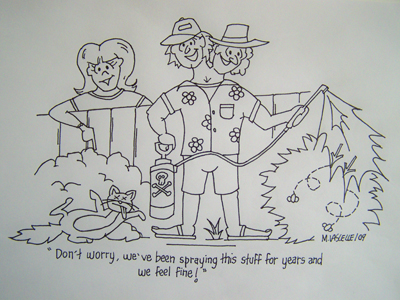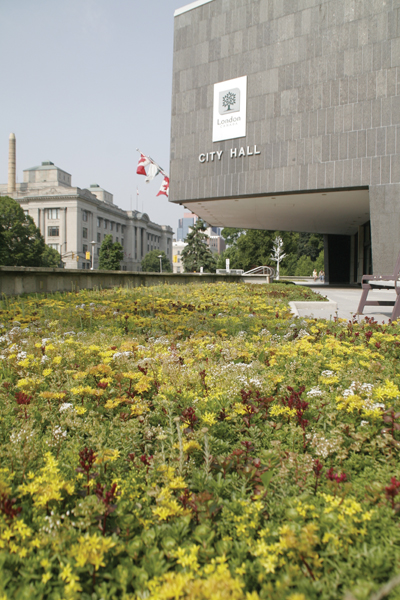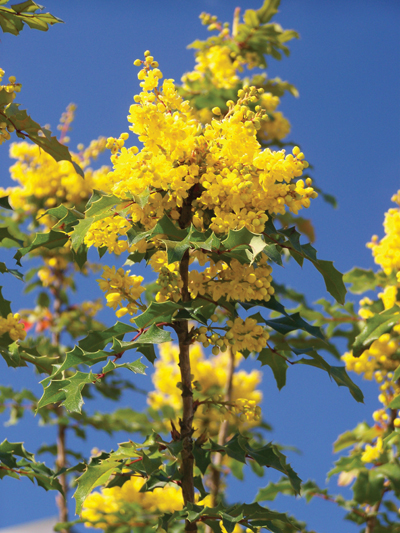
As far as the retail nursery market is concerned, the environmental revolution can be summed up in just two words, customer perception – and public opinion is looking very green these days. Who would have thought 20 years ago that we’d be planting perennials on our roofs, using microscopic nematodes as a pesticide substitute or getting concerned about contaminated run-off from our roads? Granted, green roofs and permeable parking are found primarily on large commercial projects, but their high profile has brought them to public awareness, an awareness that is changing spending habits down to the local garden centre level.
 |
| Garden centres need to be proactive in offering alternative products to chemical pesticides.
|
As far as the retail nursery market is concerned, the environmental revolution can be summed up in just two words, customer perception – and public opinion is looking very green these days. Who would have thought 20 years ago that we’d be planting perennials on our roofs, using microscopic nematodes as a pesticide substitute or getting concerned about contaminated run-off from our roads? Granted, green roofs and permeable parking are found primarily on large commercial projects, but their high profile has brought them to public awareness, an awareness that is changing spending habits down to the local garden centre level.
In order to bring our everyday practices in line with the “green” expectations of our clientele and remain a viable business, some of us are going to have to make a few changes. Here are eight simple suggestions for you to consider on your environmental quest:
Promote sustainable products – Not every organic product is sustainable with the best examples being peat moss and live sphagnum moss (culled from the wild) used to line hanging baskets. While I don’t expect the peat moss market to collapse overnight, we should be offering sustainable alternatives such as coir (a byproduct of coconut processing) and coco fibre matting.
Offer reusable or biodegradable bags – Don’t be the last in line to offer bio-degradable or reusable shopping bags. After all, is there really any benefit to having your business logo emblazoned on a bag that will become nothing but garbage or an eyesore mere hours after it has left your store?
Admit the domestic pesticide market is dead – I am of course, referring to the chemical pesticides we have been relying on and in some cases abusing for decades. From bug sprays to weed killers, the negative effects of these products on our health and the environment have been well documented. We can wait and watch as these products lose public favour (and market share) or are banned by municipal bylaws or provincial laws, or we can be proactive by discontinuing their sales in favour of organic-based pesticides and beneficial insects, such as parasitic nematodes, for controlling lawn pests.
Greening your everyday operations – Being environmentally conscious should be affecting you right down to the day-to-day tasks of running a business. Several consi-derations include the in-house recycling of beverage containers, shredded office paper, cardboard and if possible, green waste.
Encouraging staff to use mugs instead of disposable Styrofoam cups, reusing (sterile) pots and actually utilizing the organic pesticides that you promote to deal with any pest outbreaks are also important steps.

|
|
| A green roof garden on City Hall in London, Ont. | |
 |
|
| One option is to offer sustainable alternatives such as coconut fibre. | |

|
|
| Locally grown native plants like Oregon grape (Mahonia aquifolium) are environmentally friendly and sustainable.
|
Sell quality – One of the unexpected benefits of the green revolution is a consumer shift away from cheap disposable products towards quality tools that can in some instances, last them a lifetime. When you consider that the energy outputs to create and transport a poor versus quality tool are roughly the same and that a great portion of our landfills is devoted to disposable products – it only makes sense. Pricing these products fairly instead of implementing a high mark-up for quality will also make them more palatable to consumer tastes.
Buy local where possible – This is particularly important when purchasing nursery stock, as locally grown plants are already well adapted to regional climatic conditions. We also have to consider that the costs of long-haul shipping entail more than the delivery bill or fuel surcharges, as the negative effects of air pollution affect communities along the shipping route, as well as our own.
Working with Mother Nature – Quite often, we have environmental solutions well within grasp, but fail to realize the market potential. Take native plants, for instance: these shrubs and trees have adapted to local conditions over thousands of years and make ideal low-maintenance landscape specimens, most with great aesthetic appeal. Many are already available in commercial production but are often overlooked by the retail sector. By way of local example – red-flowering currant (Ribes sanguineum) and Oregon grape (Mahonia aquifolium) provide nectar or berries for birdlife and would enjoy much higher sales if stocked on a more consistent basis and promoted as being both easy-care and wildlife friendly.
Shout about your green commitments – This is no time to be modest about business improvements (and being green is a business improvement), your customers need to know that you are committed to being environmentally friendly and they need to see tangible results. The problem is, they probably won’t notice unless you use advertising, signage and word of mouth from staff to get the point across.
We are at a juncture in human history when the scales of public opinion have definitely tipped towards the “green” side and there appears to be little tolerance for “fence sitters,” as your business is going to be considered either environmentally progressive or just another uncaring polluter. Opinion is the key word here and how your community views your environmental ethics just may be the deciding factor between financial success or bankruptcy.
Print this page